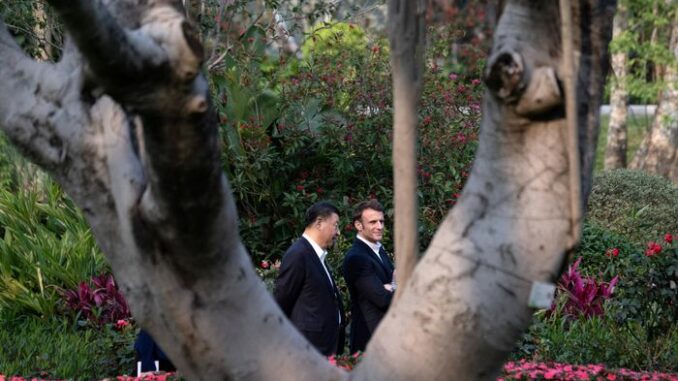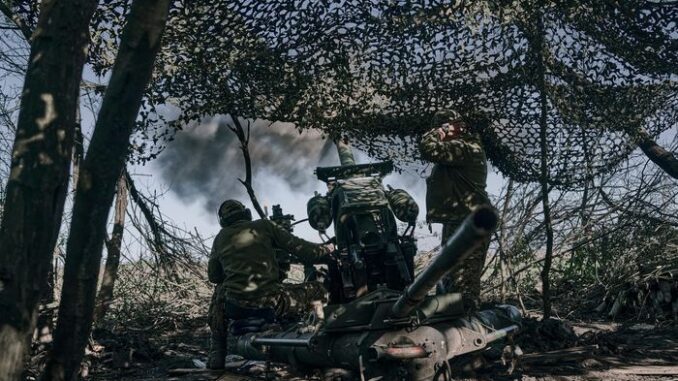T. Belman. Even the WSJ is delusional. They claim that it is Putin who is resisting talks whereas , til now, its been Binden.
“The approach is based on the belief that neither side has the ability to continue fighting indefinitely, and that Beijing’s willingness to play a role in international peace talks should be tested, the officials said. Still, they remain uncertain about Russia’s willingness to negotiate a cease-fire under Russian President Vladimir Putin.”
Gloss over it as they will, it is huge that they are looking to save them. Shows you how much they need an off ramp.
An expected offensive by Ukraine is seen as paving way for negotiations with Russia

Chinese leader Xi Jinping and French President Emmanuel Macron meeting in China last month. PHOTO: JACQUES WITT/PRESS POOL
Some U.S. and European officials said they believe that Ukraine’s planned spring offensive could pave the way for negotiations between Kyiv and Moscow by the end of the year, and that China could help bring Russia to the table.
The willingness to encourage negotiations and seek out a role for China in talks represents a shift in Western thinking, particularly in the U.S., which has been highly skeptical of any involvement for Beijing given China’s longstanding support for Moscow. Secretary of State Antony Blinken publicly expressed cautious optimism recently that Beijing could help defuse the conflict.
The approach is based on the belief that neither side has the ability to continue fighting indefinitely, and that Beijing’s willingness to play a role in international peace talks should be tested, the officials said. Still, they remain uncertain about Russia’s willingness to negotiate a cease-fire under Russian President Vladimir Putin.
The interest in negotiations brings Washington in closer alignment with some European countries, which are eager to see the conflict end, or at the very least moderate in intensity, and have been the most intent on discussing some resolution this year. The U.S., the U.K. and other countries have been publicly saying that Ukraine should be supported as long as it takes to defeat Russia.
“We have been clear that we will continue to support Ukraine as they defend their country from Russia’s unprovoked invasion, and that support will continue,” said Adam Hodge, a spokesman for the National Security Council. “Unfortunately, we see no signs that Russia is preparing to stop its attacks on the Ukrainian people. That’s why we are committed to continuing to help Ukraine protect its people against Russian aggression.”
French President Emmanuel Macron has been the most explicit in pushing Ukraine to seek negotiations with the Kremlin after the spring offensive. Officials at the White House and State Department have long maintained that all wars end at the negotiating table, but said that it will require a genuine interest on the part of Russia to approach any talks in good faith. The military aid dispatched to Ukraine is designed to put Kyiv in a stronger negotiating position.
Key U.S. officials on the National Security Council are in favor of negotiations, according to European officials, while the State Department and the Central Intelligence Agency have been more skeptical, eager to see how the offensive goes before pitching for a diplomatic off-ramp.
The State Department and the CIA didn’t respond to a request for comment.

The high attrition rates of Ukrainian troops and materiel have been cause for concern in Europe. PHOTO: LIBKOS/ASSOCIATED PRESS
Senior officials in Paris and Berlin who are familiar with their leaders’ discussions with President Biden say they expect the White House to attempt to facilitate talks following the Ukrainian offensive’s anticipated gains.
The aim is for Ukraine to regain important territory in the south, a development that could be interpreted as a success even if Russia retains chunks of territory its forces have occupied.
Olaf Scholz, the German chancellor, will host Ukrainian President Volodymyr Zelensky in Berlin this month on what is set to be his first trip to Germany since Russia invaded in February 2022. While Mr. Scholz won’t pressure Mr. Zelensky into talks, Mr. Biden is expected to signal to the Ukrainian leader that cease-fire talks might be opportune in the coming months, European officials said.
The push to negotiate comes in the midst of concern on both sides of the Atlantic that the scale of support provided by allies to Ukraine for the coming push will be hard to match in the future if the war grinds into a stalemate. The supply of ammunition is a key problem because Western industrial capacity has proven unable to meet its own demands while supporting Ukraine, several officials and industry leaders said.
A number of senior officials across European governments expressed concern about the high attrition rates of troops and materiel in Ukraine, whose population is less than one-third of Russia’s.
The European push for negotiations isn’t a consensus. Poland, the Baltic states, other smaller nations and some officials from the U.K. believe that Ukraine should be given the time it needs to make gains—even if the coming spring offensive doesn’t reshape the battlefield.
Russia faces challenges sustaining its war effort, which some believe could force it to the negotiating table. Testifying May 4 on Capitol Hill, Director of National Intelligence Avril Haines said U.S. intelligence agencies assess that Mr. Putin has little interest in negotiating a definitive settlement of the conflict and is still assuming that the West’s will to support Ukraine will erode over time.
“We continue to assess that Putin most likely calculates that time works in his favor,” said Ms. Haines.
She added that the Russian leader has probably scaled back his near-term goals in Ukraine of consolidating control in the east and south of the country and ensuring that Kyiv never joins the North Atlantic Treaty Organization. If Mr. Putin accedes to a “negotiated pause” in the conflict, she said, his goal might be to use the time to rebuild Russia’s forces for future offensive operations.
It couldn’t be determined what any sort of negotiations would look like, but officials in Paris and Berlin said they are interested in a broadly framed cease-fire agreement that would potentially involve China among its guarantors.
In February, China called for peace talks to end the war in Ukraine, outlining its plan in a 12-point document, and casting itself as a neutral mediator.
That same month, Mr. Macron offered in private to Mr. Zelensky to host a peace conference in Paris to negotiate a cease-fire when Kyiv decides the time is right. Mr. Zelensky said he would only participate if Mr. Biden and Chinese leader Xi Jinping attended.
“China will continue to promote negotiations for peace and make its own efforts for an early cease-fire and restoration of peace,” the Chinese Embassy in Washington said in a statement.
Mr. Macron and his officials, as well as other Europeans officials, have since prodded Beijing to play a constructive role in diplomacy. Those efforts culminated in Mr. Xi’s calling Mr. Zelensky in April for the first time since the war began, although officials briefed on the conversation said the call deflated hopes that the Chinese leader would shift away from supporting Russia and contained no clear commitments to uphold Ukraine’s demands.
Mr. Xi, who made a high-profile visit in March to the Kremlin, where he expressed support for Mr. Putin, will soon dispatch an envoy to Kyiv.
“It is too early to be able to say anything, and we are now waiting for Xi’s representative to arrive in Kyiv,” said a senior member of the Ukrainian government.
Nonetheless, key European leaders are now confident that China is eager to remain involved in eventual cease-fire negotiations, several European officials said.
That sentiment was echoed by Mr. Blinken. “In principle, there’s nothing wrong with that. If we have a country, whether it’s China or other countries that have significant influence, that are prepared to pursue a just and durable peace,” Mr. Blinken said last week at a Washington Post forum. “We would welcome that. And it’s certainly possible that China would have a role to play in that effort,” he said. He added that he wasn’t sure that Beijing accepted the proposition that Moscow was the aggressor.
Until recently, a number of U.S. and European officials were saying that China’s open support for Russia since the war began made Beijing unpalatable as a negotiating partner for ending the war.
Kyiv welcomes any country that can play a constructive role in their pursuit of peace, but didn’t believe Beijing was crucial, Ukraine’s ambassador to the U.S., Oksana Markarova, said recently.
Western leaders are now slowly moving toward a consensus that halting the conflict might be the best option, said Fiona Hill, a former National Security Council official responsible for Russian policy, now with the Brookings Institution.
“This seems to be where we are trending,” she said. “Freeze the conflict and stop the slaughter, because everybody would like this to stop.”
Mr. Putin has shown no public sign of winding down the war or his objectives, despite mounting losses. Any durable arrangement will most likely involve Mr. Zelensky’s acceptance of occupation of Ukrainian territory by Russia, Ms. Hill said.
“Is it sufficient for Ukraine to have effectively given up territory and countless lives and to say, ‘OK, this is what we died for?’ ” Ms. Hill asked.
Warren P. Strobel contributed to this article.
Write to Bojan Pancevski at bojan.pancevski@wsj.com, Laurence Norman at laurence.norman@wsj.com and Vivian Salama at vivian.salama@wsj.com



Leave a Reply
You must be logged in to post a comment.